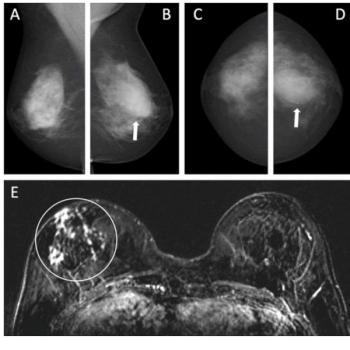
For women with intermediate risk and a personal history of breast cancer, an emerging AI system offered an 81 percent AUC for breast cancer detection, according to new research.
Senior Editor, Diagnostic Imaging

For women with intermediate risk and a personal history of breast cancer, an emerging AI system offered an 81 percent AUC for breast cancer detection, according to new research.
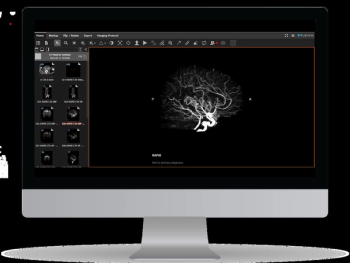
The artificial intelligence (AI)-enabled software Lumina 3D reportedly provides reconstructions of computed tomography angiography (CTA) images of the head and neck in minutes.
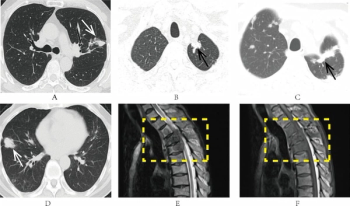
A predictive model for non-small cell lung cancer (NSCLC) recurrence, based on clinical parameters and CT findings, demonstrated an 85.2 percent AUC and 83.3 percent sensitivity rate, according to external validation testing in a new study.
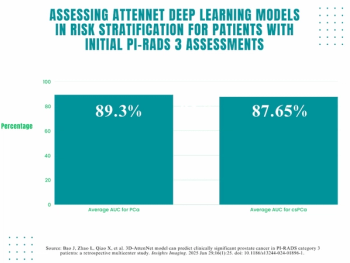
In external validation testing, a deep learning model demonstrated an average AUC of 87.6 percent for detecting clinically significant prostate cancer (csPCA) on prostate MRI for patients with PI-RADS 3 assessments.
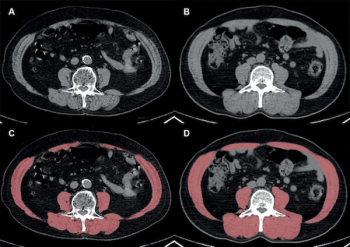
For those without low skeletal muscle mass on CT and myosteatosis, obese patients have a 23 percent lower risk of death than non-obese patients after undergoing curative resection for non-small cell lung cancer, according to newly published research.
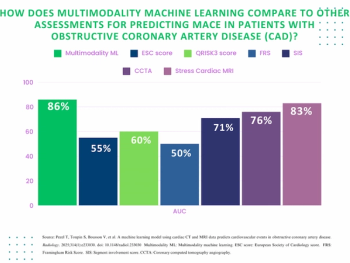
For patients with newly diagnosed obstructive coronary artery disease (CAD), a multimodal machine learning model offered an 86 percent AUC for predicting MACE, which was 10 percent higher than CCTA alone and over 35 percent higher than the Framingham Risk Score.
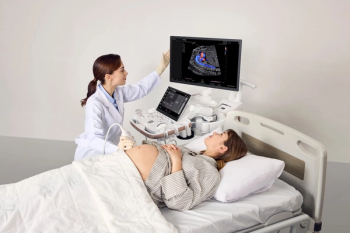
Designed for advanced OB-GYN applications, the Samsung Z20 ultrasound platform reportedly provides a combination of artificial intelligence (AI) tools and enhanced ergonomics.
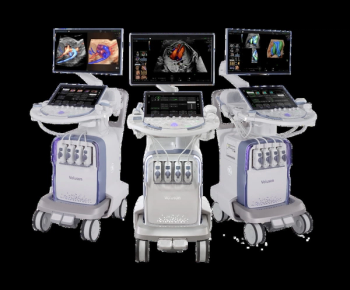
An array of AI-powered features and automated tools may lead to improved workflow and image quality with the Voluson Expert 22, 20 and 18 ultrasound systems.

In a recent interview, Joshua Gowin, M.D., discussed emerging brain MRI research that showed a significant association between heavy lifetime use of cannabis and reduced brain activity for working memory tasks in young adults.

In a recent interview, Amy Patel, M.D., discussed key points of emphasis for legislative advocacy in radiology, including long-term reform in Medicare reimbursement, improved coverage of breast cancer screening and mitigation of the ongoing radiology workforce shortage.
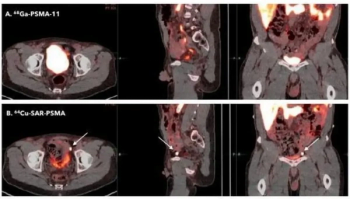
In addition to an August FDA fast track designation for PSMA PET imaging in patients with suspected metastasis, the radiopharmaceutical 64Cu-SAR-bisPSMA has earned another fast track designation for imaging of biochemical recurrence.
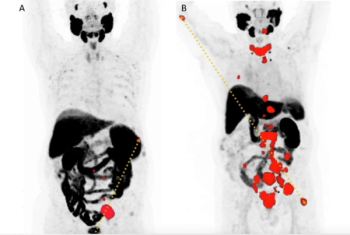
Doubling of total tumor volume on PSMA PET/CT is 41 percent more likely to reduce overall survival in patients with metastatic castration-resistant prostate cancer (mCRPC), according to new research.
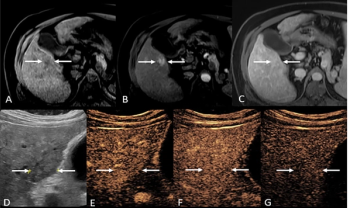
For patients previously assessed with LI-RADS LR-4 and LR-M presentations based on MRI or CT findings, the use of contrast-enhanced ultrasound led to 30 percent of these patients having LR-5 assessments definitive for hepatocellular carcinoma.
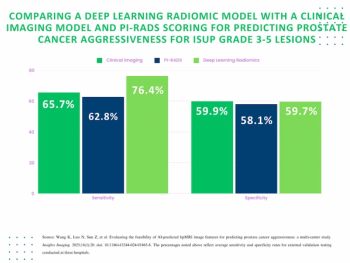
An emerging deep learning radiomics model based on biparametric MRI (bpMRI) offered a 14 to 17 percent higher AUC range than PI-RADS scoring for predicting the aggressiveness of prostate cancer, according to new research findings.
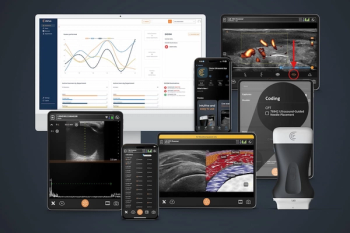
The latest ultrasound software update from Clarius includes new artificial intelligence (AI) capabilities, coding assistance and a variety of advances tailored to different fields of medicine.

Previously approved for the detection of neuritic beta amyloid plaque, the PET agent (18F)florbetaben is currently being evaluated in a phase 3 multicenter trial for the diagnosis of cardiac amyloidosis.
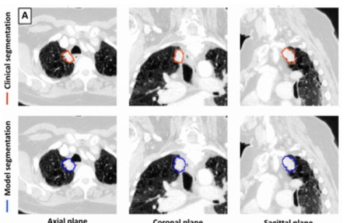
Emerging research suggests that a deep learning model may offer 92 percent sensitivity in lung tumor detection on CT scans and up to a 59 percent reduction in tumor segmentation time.
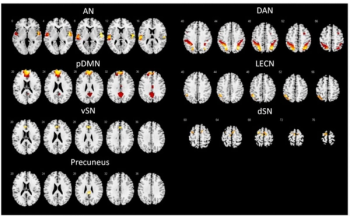
For patients with mild cognitive impairment (MCI), early changes with respect to decreased intra-network connectivity involving the default mode network or salience network may aid in differentiating between the development of Alzheimer’s disease and Parkinson’s disease, according to new MRI research.

In the second part of a two-part interview, Nina Kottler, M.D., says the transparency emphasis of the recent FDA guidance on AI-enabled software is welcome but needs to go beyond additional documentation to clarify how adjunctive AI is making its decisions.
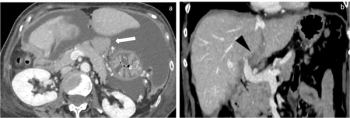
In an update of previous guidelines from the European Society of Urogenital Radiology published in 2010, a 21-expert panel offered consensus recommendations on the utility of CT, MRI and PET-CT in the staging and follow-up imaging for patients with ovarian cancer.

In the second part of a two-part interview on the recently published appropriate use criteria for brain positron emission tomography (PET) for patients with mild cognitive impairment (MCI), Phillip Kuo, M.D. discusses clinical cases involving the use of amyloid and tau PET imaging.
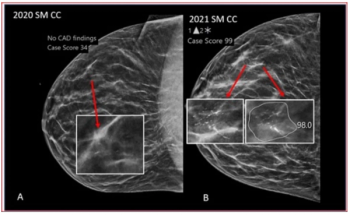
In sequential breast cancer screening with digital breast tomosynthesis (DBT), true positive examinations had more than double the AI case score of true negative examinations and the highest positive AI score changes from previous exams, according to new research.
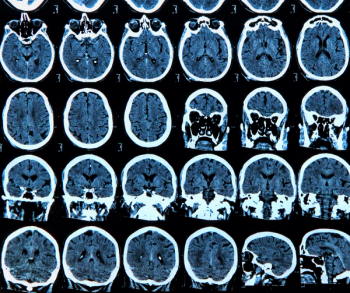
The CDM Insights software, which can be utilized with scans from 1.5T and 3T MRI, reportedly provides new measurements of cortical thickness and brain microstructure.

In the first part of a two-part interview, Nina Kottler, M.D. offers insights and perspective on the recently issued guidance from the FDA on AI-enabled devices and how it may impact developers in the radiology field.
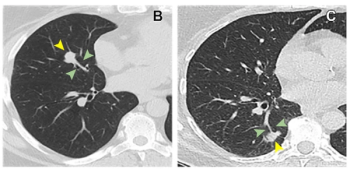
In computed tomography (CT) scans for patients with solid non-small cell lung cancer (NSCLC) < 30 mm, emerging research suggests the lollipop sign is associated with a greater than fourfold likelihood of angiolymphatic invasion.
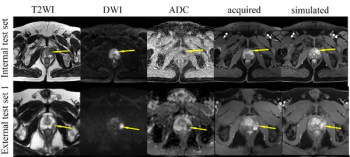
Deep learning synthesis of contrast-enhanced MRI from non-contrast prostate MRI sequences provided an average multiscale structural similarity index of 70 percent with actual contrast-enhanced prostate MRI in external validation testing from newly published research.

In a recent interview, Phillip Kuo, M.D., discussed the impact of newer anti-amyloid antibody therapies for Alzheimer’s disease upon recently issued appropriate use criteria (AUC) for amyloid positron emission tomography (PET) imaging as well as the incorporation of tau PET into the AUC for patients with mild cognitive impairment.
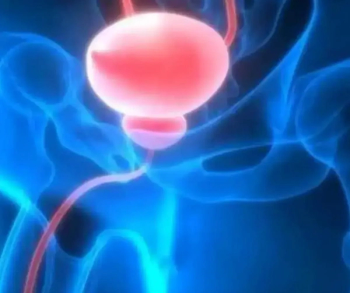
Employing baseline MRI and clinical data, an emerging deep learning model was 32 percent more likely to predict the progression of low-risk prostate cancer (PCa) to clinically significant prostate cancer (csPCa), according to new research.
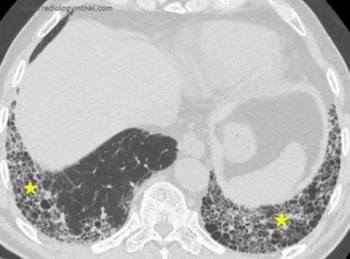
The IQ-UIP AI software may bolster computed tomography diagnosis of usual interstitial pneumonia (UIP), which is reportedly misdiagnosed in over 50 percent of cases.
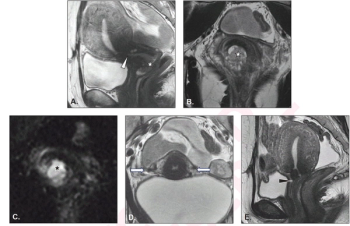
In a literature review that includes insights from recently issued guidelines from multiple European medical societies, researchers discuss the role of magnetic resonance imaging (MRI) in facilitating appropriate patient selection for fertility-sparing treatments to address early-stage endometrial and cervical cancer.